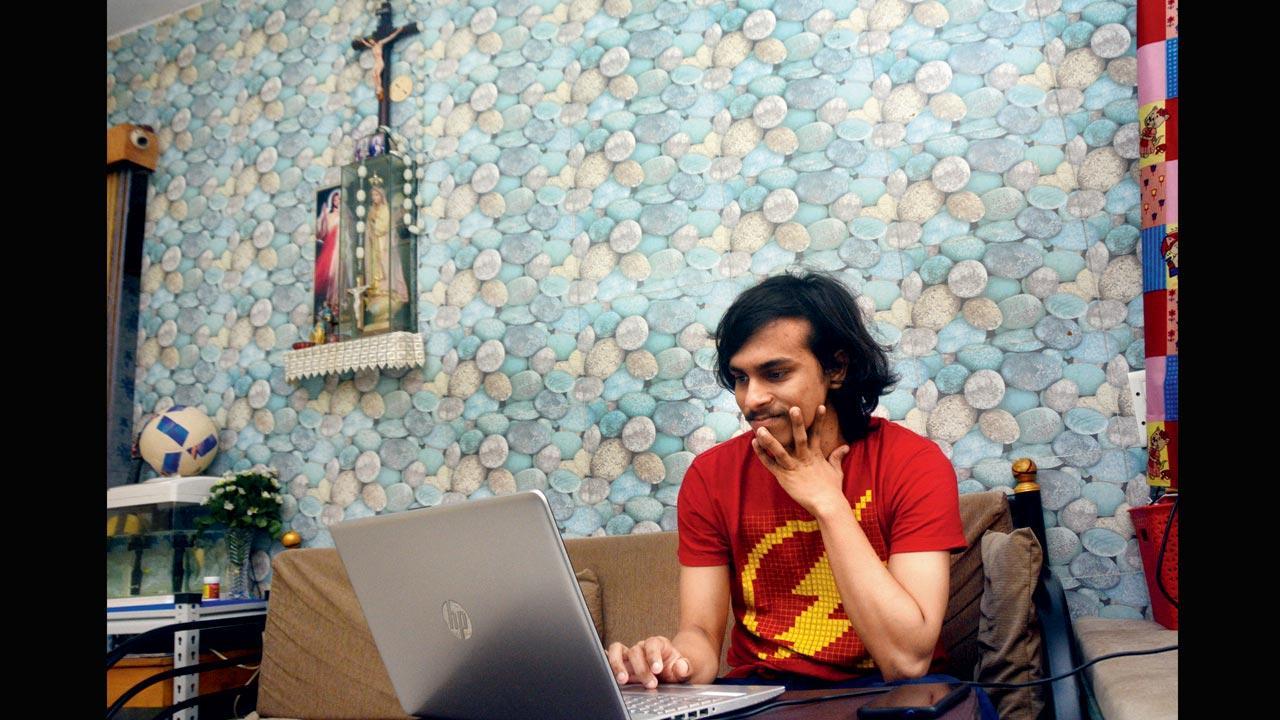The role of the office in the lives of workers is changing as WFH takes over the professional world. While the transition was difficult for everyone, some have thrived more than others. Are the silent workers saying, apna time aa gaya!

Mumbai resident Royce D’souza, 23, Assets and Cash Reconciliation Associate, says that because he didn’t have to adjust to a new physical office environment, transitioning into his first job following an MBA, was smooth. Pic/Satej Shinde
One man’s curse is another man’s blessing. The Coronavirus-induced lockdown which forced the Work From Home professional scenario onto every working Indian, turned out to be an impediment for many, especially those who thrive on the support of colleagues and by interactions with seniors. But there are those who will tell you that it has come as a blessing in their professional journey.
ADVERTISEMENT
According to a report in the BBC, when the world transitioned to remote work near the start of the pandemic, an employee’s ability to adapt became quickly apparent. Some professionals were able to do their jobs just as well, or even better, than they could in the office. And experts say, several of these could be introverts by nature. Empathy and a propensity towards more thoughtful communication made introverts shine during remote working, believes Beth Buelow, career coach and author of The Introvert Entrepreneur.
Andrew Rego, Senior Associate, Business Development at Sporjo, became the highest individual revenue earner for the company, nine months in a row
Rowena Fernandes, Senior Product Manager, Wadia Group (Bombay Dyeing), calls herself reticent and not very outspoken. “I choose my words carefully. I think the good side to being an introvert is that you introspect. However, in order to reflect, you require space and privacy, which the lockdown has provided me. I feel as if I have plenty of physical and mental space now.” For Fernandes, meetings and conferences are now far more productive than they were when held face to face. She calls them time and money drainers. But, WFH offered her extra time in the day to sign up for talks and workshops where people she wished to hear and admired, shared their knowledge. “I’ve had a chance to hear minds from across the world. With online conferences, it became a level playing field, and communication was simpler. The anxiety of not knowing how to approach someone no longer exists, she admits.
Andrew Rego, Senior Associate, Business Development at Sporjo, was an introvert as a child and rarely interacted. He says he continues to be conscious and nervous by disposition. During the pandemic last year, he was looking for work and was offered a position in sales. But, selling meant high levels of interaction. “In general, I dislike being in a crowded environment. Unfavourable reactions from people has affected my self-esteem, and made me withdraw into a shell. But, after seeing people in high positions lose their jobs, I decided to step up and give it my all. I’m starting to like my job now, and the WFH situation has really helped. Interacting with my colleagues while being rooted in the familiarity of home, allowed me to communicate effectively and with ease. I think I’m gaining confidence. For nine months straight, I have been the highest individual revenue earner for the company,” he beams.
Lamia Bagasrawala, psychotherapist
Rego is demonstrating what a survey of nearly a million US workers at Fortune 500 companies, had revealed. It revealed that productivity has remained stable or increased since employees began working remotely. According to the survey, some workers have shown that remote work is both feasible and profitable.
It hasn’t been very different for introverted students either. Royce D’souza, now an assets and cash reconciliation associate, was pursuing an MBA degree when the pandemic broke. His classes moved online, and while at home, he says he was able to concentrate better. “When I had to sit in for interviews, I was easily able to crack the sessions, because the level of intimidation that face-toface interactions put me through, was now missing. When I joined my firm, I didn’t have to struggle to adjust to a new office and professional environment either. The transition was smooth because I was on familiar terrain. I think it has helped me stay quick and efficient.”
Shrivallabh K, Managing Director, of Dimenzion3 Global Solutions Pvt Ltd
Shrivallabh K, Managing Director of Dimenzion3 Global Solutions Pvt Ltd, a market leader in Inclusion and Diversity, Sales and Leadership Capability development consulting, believes that introversion and extroversion by themselves are not direct reflectors of professional performance. “There are limitations in freedom and freedom in limitations. And this is what seems to have worked for introverts today. They have found a new kind of liberty in the restrictions that have been presented by the pandemic.” He clarifies that it’s not as if silent workers have suddenly grown efficient. They always were, but since they tend to need more space and me time, which the lockdown offered, they were able to achieve their milestones sooner. “Your focus and energy usually defines how you perform. Because of the elimination of interactions and interruptions, and the flexibility WFH offers, they are a far happier lot. Extroverts may view this situation as restricting, while introverts are looking at it as new found freedom.”
Shrink Speak
Lamia Bagasrawala, psychotherapist, says, “A physical office frequently brings with it a work environment that allows for peer interaction, focused discussions, and a separation from other aspects of our lives. However, WFH has proven to be beneficial to some clients, especially those who are anxious about physical interactions and meetings. It allows immense flexibility, particularly when a team or an individual is working independently. Such flexibility, if allowed by organisations even within the office, can work wonders to boost productivity and motivation.”
 Subscribe today by clicking the link and stay updated with the latest news!" Click here!
Subscribe today by clicking the link and stay updated with the latest news!" Click here!







